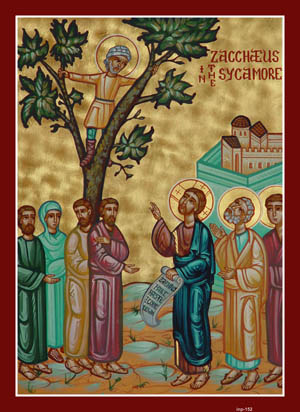 Central Idea: God’s loving goodness. Doctrine: God is love. Practical Application: Divine reading.
Central Idea: God’s loving goodness. Doctrine: God is love. Practical Application: Divine reading.
To view Lectionary 153, click here.
Central Idea: God’s loving goodness
Reading 1 Wis 11:22-12:2
- God is the omnipotent creator and sustainer of all that exists and everything he creates is good in itself and God loves it.
- God is omniscient and infinitely merciful and so only little by little shows us our true condition due to our sins and offenses, because we could not stand it if we saw who we are all at once.
Responsorial Psalm Ps 145:1-2, 8-9, 10-11, 13, 14
- How would Zacchaeus pray this psalm after his encounter with Christ? Because God’s salvation has come to him today, he would pray this and mean every word, especially God’s merciful grace that held back his anger toward Zacchaeus’ sin in anticipation of his repentance.
Reading 2 2 Thes 1:11-2:2
- When will Christ return? St. Paul tells the Thessalonians, pay no attention to people who claim to know something about this. Instead our aim must be to cooperate with grace to do what God wants of us now.
- What does God want of us now? That we will cooperate with God to make us into what he wants to make us into. As St. Iranaeus put it, “The glory of God is man fully alive” (CCC 294).
Gospel Lk 19:1-10
- Our Lord changed his plans to pass through Jericho when he saw Zacchaeus, and the short fellow changed his life when he saw Christ. Christ’s appearance, his body language, his words, and his tone of voice must have reached Zacchaeus with a flood of grace. And that grace must have met something in Zacchaeus, an openness to receive that grace, just as he then received Christ into his home and gave away his wealth.
- We can love our neighbor if we receive the love of God. Zacchaeus used his wealth to make things right.
- Blatant sinners can sometimes make a more dramatic conversion to God that the supposed “righteous.” The reason is that the sinner has fully committed himself to the good he thinks can be gotten by means of that bad course of action, yet he knows by bitter experience it is not so. It can sometimes be harder for those who are trying to be good, since they have had to hide even from themselves their own disordered attachments.
- We can all take great comfort in this Gospel, that the Son of Man came to seek and to save what was lost, because we know we too need to be found and rescued by God.
Doctrine: God is love
- God is love; that is, his very being is love. The secret about God’s love revealed in Christ and in the sending of the Holy Spirit is that “God himself is an eternal exchange of love, Father, Son, and Holy Spirit, and he has destined us to share in that exchange” (CCC 221).
- God’s love is everlasting. As God declared through Jeremiah, “I have loved you with an everlasting love” (Jer 31:3) (CCC 220).
- Some images of God’s love for us are a father for his son, a mother for her children, a bridegroom for his beloved (CCC 219).
Practical Application: Divine reading
- One of the best things we can do for ourselves and others is to dwell on God’s goodness in meditative prayer. We can do this with any of this Sunday’s readings.
- In our Catholic tradition, meditation is not emptying the mind but filling it with God’s Word. Lectio divina or divine reading is a four-step method for reading the Sacred Scriptures.
- First one reads the Scriptural passage slowly, focusing on what the Word of God is saying (lectio). Then, one reflects on the passage, on what it means in itself and how it applies to one’s life (meditatio). Then one talks to God about what he or she has learned or experienced in meditating about it (oratio). Finally one listens silently for God’s response (contemplatio).
For the readings for the Solemnity of All Saints click here.
Leave a Reply